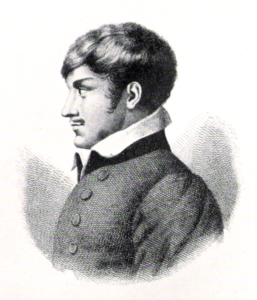Above Wildemann
(Poet's title: Über Wildemann)
Set by Schubert:
D 884
[March 1826]
Die Winde sausen
Am Tannenhang,
Die Quellen brausen
Das Tal entlang;
Ich wandre in Eile
Durch Wald und Schnee,
Wohl manche Meile
Von Höh zu Höh.
Und will das Leben
Im freien Tal
Sich auch schon heben
Zum Sonnenstrahl,
Ich muss vorüber
Mit wildem Sinn
Und blicke lieber
Zum Winter hin.
Auf grünen Heiden,
Auf bunten Au’n,
Müsst ich mein Leiden
Nur immer schaun,
Dass selbst am Steine
Das Leben sprießt,
Und ach, nur Eine
Ihr Herz verschließt.
O Liebe, Liebe,
O Maienhauch,
Du drängst die Triebe
Aus Baum und Strauch,
Die Vögel singen
Auf grünen Höhn,
Die Quellen springen
Bei deinem Wehn.
Mich lässt du schweifen
Im dunklen Wahn
Durch Windespfeifen
Auf rauer Bahn.
O Frühlingsschimmer,
O Blütenschein!
Soll ich denn nimmer
Mich dein erfreun?
The winds are roaring
On the slopes covered in fir trees,
The springs are gurgling
All along the valley,
I have been rushing along
Through woods and snow
For many a mile now,
From hilltop to hilltop.
And if life
In the open valley
Also rises up
Into the sunbeams,
I shall have to go on
With a savage determination
And turn my eyes
Towards winter.
On green heathland,
On colourful meadows,
I would only be able to see my suffering,
I would be looking at it all the time,
Knowing that even from stones
Life can spring,
And alas, only one person
Has closed her heart.
Oh love, love,
Oh breath of May!
You are pushing up the shoots
From the trees and bushes;
The birds are singing
On the green heights;
The springs are gushing
At your inspiration!
You leave me to roam
In dark confusion
Through the blowing wind
On my rough course.
Oh shimmer of spring,
Oh shining blossom,
Shall I therefore never
Enjoy you?
All translations into English that appear on this website, unless otherwise stated, are by Malcolm Wren. You are free to use them on condition that you acknowledge Malcolm Wren as the translator and schubertsong.uk as the source. Unless otherwise stated, the comments and essays that appear after the texts and translations are by Malcolm Wren and are © Copyright.
☙
Themes and images in this text:
Birds Breath and breathing Colour (general) Detours and delusions Fields and meadows Flowers Germination, shoots and sprouting Green Heathland and moors Hills and mountains May Moving around (schweifen) Pine trees Pipes and flutes Snow Spring (season) Springs, sources and fountains Valleys Walking and wandering Wind Woods – large woods and forests (Wald)
When this poem was published in Schulze’s Poetisches Tagebuch (Poetic Diary) its heading was “Über Wildemann, einem Bergstädtchen am Harz. Den 28sten April 1816” (Above Wildemann, a little town in the hills by the Harz. 28th April 1816). Wildemann[1] is nestled in a valley between Goslar and Göttingen (where Schulze was living) and, as in Schulze’s day, fir trees line the slopes up to the surrounding hill tops.
It is here where Schulze says he has been tramping about, avoiding the first stirrings of spring down in the valley. As April came to a close he feared the arrival of May, with its explosion of new life, all of which would remind him of what he had lost. He wants to stay in the uplands, where winter still holds sway.
He need not have worried, though. 1816 turned out to be the ‘year without a summer’ as a result of the eruption of Mount Tambora in Sumbawa (then the Dutch East Indies, now Indonesia). This had a profound effect on the climate of the northern hemisphere, and was to lead to failed harvests in Germany, Britain and New England (amongst other places). Although blossoms DID appear in May 1816 (and the poet wrote about them in the poems he dated then), the temperature did not rise sufficiently in the course of the summer to allow the grain or the fruit to ripen effectively.
The poet’s preference for winter over summer, for bleakness over colour, is not presented as the product of a passing mood or a depressive personality. In fact, the poem identifies ‘the heights’ as his preferred location and he does not want to go ‘down’ into the valley. He is ‘above’ the world of ordinary life. There is something exhilarating for him about being on this ‘rough course’. We might want to conclude, though, that there are elements of bipolarity here, in which case, the poem is a product of not of depression but of manic highs.
[1] https://de.wikipedia.org/wiki/Wildemann

Kassandro / CC BY-SA (https://creativecommons.org/licenses/by-sa/3.0)
☙
Original Spelling Über Wildemann Die Winde sausen Am Tannenhang, Die Quellen brausen Das Thal entlang; Ich wandre in Eile Durch Wald und Schnee, Wohl manche Meile Von Höh zu Höh. Und will das Leben Im freien Thal Sich auch schon heben Zum Sonnenstrahl; Ich muß vorüber Mit wildem Sinn Und blicke lieber Zum Winter hin. Auf grünen Haiden, Auf bunten Au'n, Müßt’ ich mein Leiden Nur immer schaun, Daß selbst am Steine Das Leben sprießt, Und ach! nur Eine Ihr Herz verschließt. O Liebe, Liebe, O Mayenhauch! Du drängst die Triebe Aus Baum und Strauch; Die Vögel singen Auf grünen Höhn; Die Quellen springen Bei deinem Wehn! Mich läßt du schweifen Im dunklen Wahn Durch Windespfeifen Auf rauher Bahn. O Frühlingsschimmer, O Blüthenschein, Soll ich denn nimmer Mich dein erfreun?
Confirmed by Peter Rastl with Schubert’s source, Ernst Schulze’s sämmtliche poetische Schriften. Dritter Band. I. Poetisches Tagebuch. […] Leipzig: F. A. Brockhaus. 1819, pages 172-173; and with Sämmtliche poetische Werke von Ernst Schulze. Neue Ausgabe mit sechszehn Kupfern. Dritter Theil. Leipzig: F. A. Brockhaus. 1822, pages 176-177.
To see an early edition of the text, go to page 172 [188 von 336] here: http://digital.onb.ac.at/OnbViewer/viewer.faces?doc=ABO_%2BZ170542803


